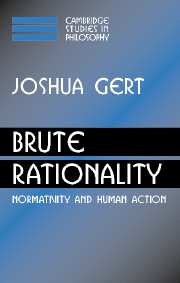Book contents
- Frontmatter
- Contents
- Preface and acknowledgements
- 1 What would an adequate theory of rationality be like?
- 2 Practical rationality, morality, and purely justificatory reasons
- 3 The criticism from internalism about practical reasons
- 4 A functional role analysis of reasons
- 5 Accounting for our actual normative judgments
- 6 Fitting the view into the contemporary debate
- 7 Two concepts of rationality
- 8 Internalism and different kinds of reasons
- 9 Brute rationality
- References
- Index
2 - Practical rationality, morality, and purely justificatory reasons
Published online by Cambridge University Press: 22 September 2009
- Frontmatter
- Contents
- Preface and acknowledgements
- 1 What would an adequate theory of rationality be like?
- 2 Practical rationality, morality, and purely justificatory reasons
- 3 The criticism from internalism about practical reasons
- 4 A functional role analysis of reasons
- 5 Accounting for our actual normative judgments
- 6 Fitting the view into the contemporary debate
- 7 Two concepts of rationality
- 8 Internalism and different kinds of reasons
- 9 Brute rationality
- References
- Index
Summary
Because the normative notions of practical and theoretical rationality seem, due to their respective names, to be species of one genus, it is often assumed that there should be a very strong parallel between the two notions. In particular, it is often assumed that for practical rationality, the business of normative reasons is to count in favor of (or against) doing something, and that for theoretical rationality, the business of normative reasons is to count in favor of (or against) believing something. And in both cases it is assumed that reasons do this by providing justification which either is requirement, or which would tend, if the reasons became stronger or more numerous, to mount in strength and become requirement. A closely related position holds that if a belief is held for no reason, or if an action is done for no reason, then the respective belief or action is unjustified and irrational. As more theoretical reasons are found for the belief, or as more practical reasons are found for the action, or as existing reasons become stronger, the belief or the action becomes increasingly justified. If the justification becomes strong enough, then the belief or the action is required.
The above position, that sufficient justifying reasons will always yield requirement, is consistent with two interpretations. The first interpretation, (a), allows some actions and beliefs to be justified but not required.
- Type
- Chapter
- Information
- Brute RationalityNormativity and Human Action, pp. 19 - 39Publisher: Cambridge University PressPrint publication year: 2004



